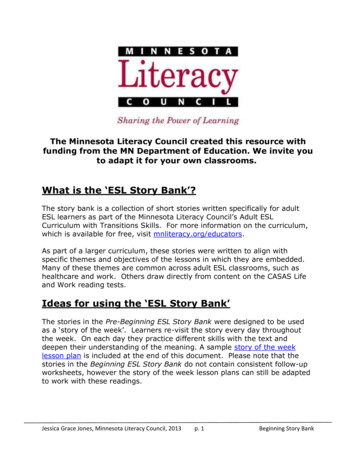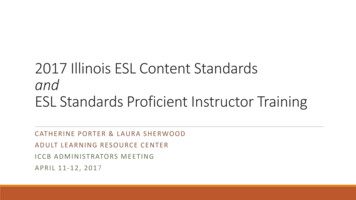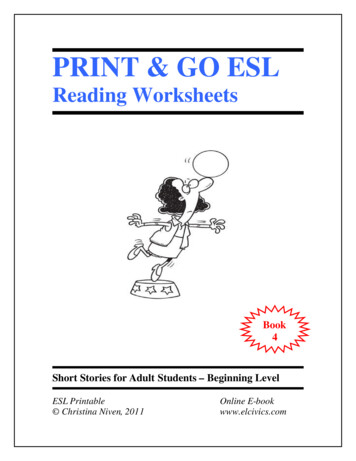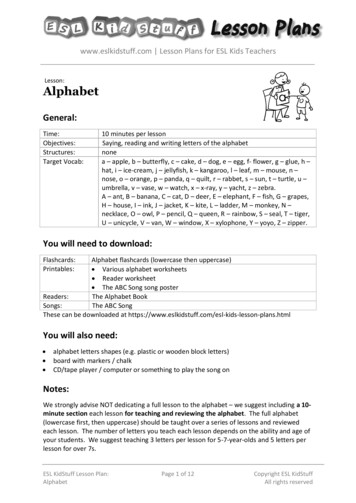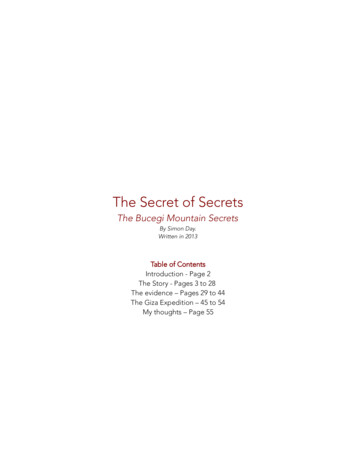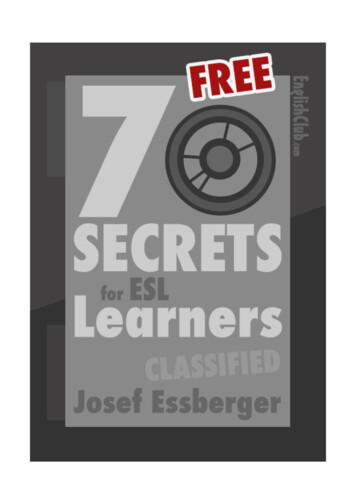
Transcription
All Rights ReservedPublished by EnglishClubwww.englishclub.com EnglishClub.com 2020
7 Secrets for ESL LearnersDear English Learner,These secrets are the earliest secrets that I wrote forEnglish learners when I started EnglishClub back in 1997—and they still hold good today. They are very simple butthey carry a lot of weight. If you put them into practiceyour English WILL improve.Here’s to your progress!Best regards,JosefJosef Essberger, FounderEnglishClub.comCambridge 2020
Secret #1: Learn about Word StressWord Stress is golden key number One for speaking andunderstanding English.Word Stress is very important. You can try to learn aboutWord Stress. This is one of the best ways for you tounderstand spoken English—especially English spokenfast.What is Word Stress?Take 3 words: photograph, photographer,photographic, for example. Do they sound the samewhen spoken? No! They sound very different, because onesyllable in each word is "stressed" (stronger than theothers).PHOtographphoTOgrapherphotoGRAPHicThis happens in all words with two or more syllables:TEACHer, JaPAN, CHINa, aBOVE, converSAtion,INteresting, imPORtant, deMAND, etCETeraThe syllables that are not stressed are “weak” or “small” or“quiet”. Native speakers of English listen for the stressedsyllables, not the weak syllables. If you use Word Stress inyour speech, you will instantly and automatically improveyour pronunciation and your comprehension.
If you have an English teacher, ask him or her to help youunderstand Word Stress. Try to hear the stress in wordseach time you listen to English—on the radio, or in filmsfor example. Your first step is to hear and recognise it.After that, you can use it!More about Word Stress—with audio—at:www.englishclub.com/word-stress
Secret #2: Sentence StressSentence Stress is golden key number two for speaking andunderstanding English. With Sentence Stress, somewords in a sentence are “stressed” (loud) and other wordsare weak (quiet). Look at the following sentence:We want to go.Do we say every word with the same stress or force? No!We make the important words big and the unimportantwords small. What are the important words in thissentence? Yes, you're right: WANT and GO.We WANT to GO.We WANT to GO to WORK.We DON'T WANT to GO to WORK.We DON'T WANT to GO to WORK at NIGHT.It’s impossible to explain everything about Sentence Stressin this short ebook. The important thing for you is that youknow it exists and try to learn about it. Sentence Stress isvery important!More about Sentence Stress—with audio—at:www.englishclub.com/sentence-stress
Secret #3: Listen! Listen! Listen!Students sometimes say: “I don’t listen to the BBC news onthe radio because it’s too fast for me and I can’t understandit.” That's a pity! When it’s too fast for you, when you can’tunderstand it, that is exactly when you NEED to listen toit!!!How can you improve if you don't listen and practise?When you were a baby, did you understand your ownlanguage? When you were 3 weeks old, or 2 months, or 1year, did you understand everything? Of course not! Butyou learned to understand by listening. Think about it.You learned to understand your own language by listening,24 hours a day, 7 days a week. After that, you learned tospeak. Then you learned to read. And then you learned towrite. But listening came first!More about Listening at:www.englishclub.com/listening
Secret #4: Don’t Listen!In the last secret I said listen! listen! listen! Now I saydon’t listen! What do I mean?!Do you know the difference between the verbs listen andhear? TO LISTEN is active. TO HEAR is passive.Sometimes you can LISTEN too hard. Sometimes you canTRY too hard. Sometimes it is better only to HEAR. Let theradio play. Let the MP3 play. But DON'T listen. JustHEAR. Your subconscious will listen for you. And you willstill learn. If you consciously listen and try to understand,you may block on one word and get frustrated. Don'tworry! Just HEAR! Believe me, you will still be learning.The important thing is to let the radio or MP3 or televisionor DVD PLAY. Let it play. And you—you do nothing. Yourbrain will HEAR, your subconscious will LISTEN and youwill LEARN!WordChecker:passive (adjective): accepting; allowing what happenswithout resistancesubconscious (noun): the part of our mind that we are notfully aware ofMore about NOT Listeningwww.englishclub.com/listening
Secret #5: Improve Your Vocabulary With5 Words a DayVocabulary is easy! How many days in a year are there?365, normally (on Earth).If you learn only 5 new words a day, you will learn 5 x 365 1,825 new words in a year. ONE THOUSAND, EIGHTHUNDRED AND TWENTY-FIVE WORDS.That is a lot of new words.And we are not counting all the other words you will learnin other ways - reading, conversation and so on.Buy a notebook and write in 5 new words each day, everyday. Learn them! You will soon have an excellentvocabulary.More about Vocabulary at:www.englishclub.com/vocabulary
Secret #6: 30 Minutes a Day Better Than3.5 Hours a WeekIn fact, 30 minutes of English study once a day is betterthan 5 HOURS once a week! Study regularly. Studyoften.LITTLE OFTEN is better than LOT SOMETIMES.It's easier, too. You can easily find 30 minutes each day.How? You can get up 30 minutes earlier. Or have a shorterlunch break. Fix a particular time every day—and keep it!Some games and quizzes to look at every om/esl-quizzes
Secret #7: Revise! Revise! Revise!If you revise, you'll improve your learning by 100%.What does “revise” mean? It means “read again” (BrE).You should be systematic about this. When you learnsomething, you should note it. Then you should look at itagain, 3 times:—after 1 day—after 1 week—after 1 monthEach time you revise, test yourself.Learn, revise, test.Revise, test.Revise, test.WordChecker:revise (verb)1 (BrE): re-read to improve knowledge2 (BrE & AmE): read and updateSome grammar and homework to help you revise:www.englishclub.com/grammar
eBooks from Josef EssbergerLearn English in SevenImprove your English with the power of 7English Prepositions List“Really useful.” Profr. José Antonio Avilés Cosio, Institutode Inglés América, La Paz, MexicoEssential Business WordsVocabulary for success in business
7 Secrets for ESL Learners Dear English Learner, These secrets are the earliest secrets that I wrote for English learners when I started EnglishClub back in 1997— and they still hold good today. They are very simple but they carry a lot of weight. If you put them into practice your Englis

